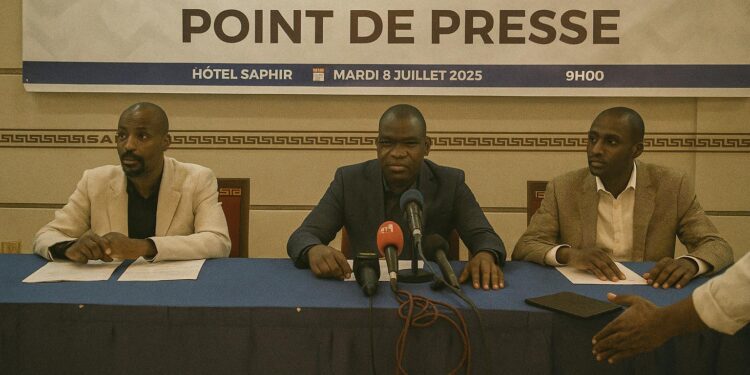A Violet Standard Appears in the Pool
Few symbols carry as much emotional resonance as a national flag. When civil-society activist Joly Asselé Ontounou alerted the press on 8 July to what he called an “illegal violet flag” fluttering above certain localities in the Pool department, the revelation instantly drew diplomatic attention. According to his statement relayed by the national news agency, the tricolour green-yellow-red banner prescribed by the 1992 Constitution had allegedly been altered by supporters of Frédérick Bintsamou, the former rebel figure popularly known as Pasteur Ntumi. The added violet stripe, Mr Ontounou contended, amounted to a fourth colour and to an affront to state sovereignty.
The Constitutional Sanctity of Symbols
In Congo-Brazzaville, the protective halo surrounding national emblems is unambiguous. Article 3 of the Basic Law stipulates that the flag “shall not be modified under any circumstance”. Legal scholars at Marien-Ngouabi University argue that tampering with the flag could, in theory, engage articles of the Penal Code dealing with offences against the State. Although jurisprudence on this matter remains limited, comparable proceedings were invoked during the post-conflict years of the early 2000s to deter secessionist messaging (Centre d’Études Juridiques de Brazzaville, 2021). In the present case, the combination of violet with the established tricolour raises questions that are simultaneously legal, semiotic and political.
Ntumi’s Political Trajectory and Symbolic Capital
Pasteur Ntumi occupies a peculiar space in Congolese political memory. His National Council of Republicans (CNR), registered legally since 2017, emerged from successive rounds of peace talks that culminated in the 2023 Cestra accords. Those negotiations, facilitated by the government with support from regional mediators, granted the CNR freedom of association in exchange for disarmament. Analysts note that the violet colour has long featured in CNR paraphernalia, interpreted by party cadres as a sign of spiritual renewal. Yet elevating a partisan shade to flag status can blur the frontier between lawful political expression and a challenge to the res publica. Diplomatic observers stationed in Brazzaville underline that Mr Bintsamou has repeatedly professed loyalty to the Republic, even attending national reconciliation ceremonies in Kinkala last year (UN Office for Central Africa, 2023).
Governmental Poise and Measured Vigilance
Thus far, the central government has opted for prudence rather than escalation. Senior officials at the Ministry of Territorial Administration privately acknowledge the reports but emphasise verification before any legal step is taken. A source close to the minister describes the strategy as “watchful containment” designed to avoid unnecessary tension while guaranteeing the supremacy of constitutional symbols. This stance resonates with President Denis Sassou Nguesso’s repeated calls for “peace of the brave” and sustainable development in the Pool, a region historically scarred by conflict yet pivotal to agricultural revival plans outlined in the National Development Strategy 2022-2026.
Regional Security Context and External Perceptions
The Pool department borders the capital and hosts critical transport arteries, making any hint of parallel authority a matter of regional security concern. The International Conference on the Great Lakes Region has urged member states to be vigilant about iconography capable of inflaming identity politics (ICGLR communiqué, April 2024). Foreign missions in Brazzaville, while refraining from public comment, quietly praise the government for favouring dialogue over coercion. A European diplomat observes that Brazzaville’s calibrated approach contrasts with more forceful reactions witnessed elsewhere in Central Africa, mitigating risks of displacement and humanitarian stress.
The 2026 Electoral Horizon
With legislative and local elections due in 2026, flag symbolism takes on electoral overtones. Opposition groupings have historically used colours to solidify identity; however, transforming the national flag touches a raw nerve. Political scientist Éric Massamba suggests that ensuring inclusive civic education campaigns before the polls could defuse latent tensions. The government has already commissioned the Independent National Electoral Commission to integrate sessions on constitutional symbolism into its voter-outreach programme, an initiative welcomed by civil-society networks allied with the Observatory led by Mr Ontounou.
Balancing Pluralism with the Imperative of Unity
At the heart of the present debate lies an enduring challenge for post-conflict societies: how to accommodate a plurality of political expressions without diluting national cohesion. Brazzaville’s authorities, seasoned by decades of mediation, appear committed to walking that fine line. By privileging legality, encouraging calm scrutiny and inviting all stakeholders to uphold state symbols, the Republic of Congo seeks to turn a potential flashpoint into an exercise in democratic maturation. Whether the violet banner will vanish as quietly as it appeared may ultimately depend less on courts than on the collective will to translate the 2023 peace accords into everyday civic practice.












































